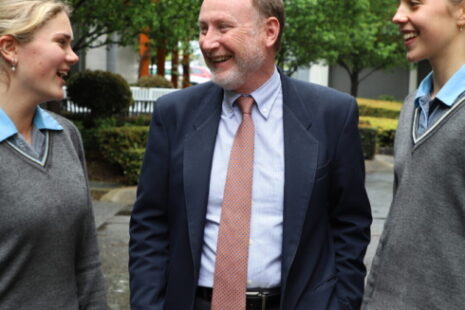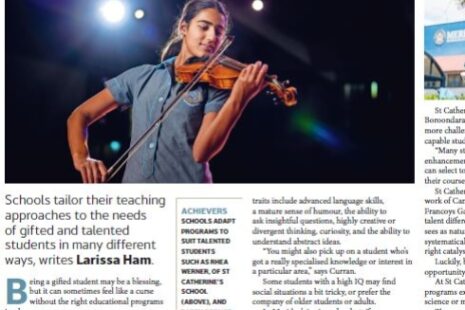The Value of Pursuit

This week, St Catherine’s Principal, Michelle Carroll explores why the value of pursuit and experiencing failure are essential elements to developing students’ emotional intelligence and character.
I was interested to recently read research undertaken by Katty Kay and Claire Shipman, authors of The Confidence Code: The Science and Art of Self-Assurance and their newly released book and journal, The Confidence Code for Girls. The authors commissioned research targeting the tween to teen age group and importantly, their changing levels of confidence and what they identified as the key drivers of this change.
The survey of 1,300 girls between the ages of 8 to 18 years, and their parents, showed confidence levels were evenly matched for boys and girls until the age of 12. However, between the ages of 8 and 14, girls’ confidence levels dipped by up to 30%.
“As girls approach adolescence, that openness to risk and failure becomes buried under an avalanche of biological and cultural signals telling them to be careful, value perfection, and avoid risk at all possible costs.” Kay and Shipman suggest parents and society reinforce such messages and behaviours at the same time that girls’ brains are being flooded with estrogen, which heightens their emotional intelligence yet curbs their risk-taking behaviours.
Whilst this heightened emotional intelligence allows girls to better read the emotional landscape around them, it also makes them more observant, more cautious, and less likely to try.
As evidenced by external data such as NAPLAN and VCE results, girls are excelling. This is particularly true in academics with girls’ performances generally exceeding that of boys, most notably in literacy. Sadly, at the same time, girls’ anxiety rates have markedly increased over the past ten years.
Coupled with academic expectations, and being a ‘good girl,’ the pressure from a flood of images on social media adds to this pressure, and unwittingly encourages perfectionistic, people-pleasing tendencies.
Such expectations are intrinsically connected with overthinking and a lack of willingness to build confidence through trying, with the risk of failing ever present in their decision making. The research data revealed that the percentage of girls who say they are not allowed to fail rises 150% between the ages of 12 and 13. Forty-five percent of 13-year olds say they do not feel able to fail.
Undoubtedly, confidence hinges on action. The process of struggling and failure are intricately woven into the self-belief of one’s ability to try new things and participate in activities perceived to be challenging and beyond their comfort zone.
Raising the tween to teen girl can often be considered counter-intuitive, with parents encouraged to curb their impulse to help their daughters navigate the world. Allowing them to make mistakes and figuring out how to rebound is an important phase of their growth. Curbing rumination, catastrophising and negative thinking is equally essential in the daily dialogue with the young teens.

The percentage of girls who say they are not allowed to fail rises 150% between the ages of 12 and 13
During COVID lockdowns, social media was shown to have increased benefits by providing a much needed connection for isolated youth. However, while the use of phones is ubiquitous, it can also reduce confidence markedly. It can be challenging for girls to ‘escape the drama’ and get away from problems, with misunderstandings between friends and frenemies quickly escalating.
Interestingly, recent research has shown that when girls follow high-achieving women on social media who share their interests, their world views are expanded markedly, with a vision for possibilities newly imagined. So, instead of fighting the uphill battle against phones, parents could insist that their daughter follow four women who work in areas that interest them.
At St Catherine’s, we understand for tweens and teens the need to increase healthy risk taking and failure in their daily diets. Recognising risk and failure and the process of recovery and mastery are the very things that create confidence and enable girls to build more of it.
Whilst our staff aim to create safe passages of travel between Year levels, and importantly the signature transition from Junior School to Senior School, guided levels of challenge and safe risk taking are also made available.
Exposure to new challenges through the encouragement of participating in new co-curricular pursuits, stepping forward in our Beyond Boundaries Camp Program and, most notably, seeking opportunities within the classroom to provide students time to think aloud, work in teams and find their voice amongst their peers, are essential. So too is learning to share one’s own thoughts and listening respectfully to the opinions of others.
Franklin D Roosevelt reflected that “a smooth sea never made a skillful sailor.” St Catherine’s recognises the value of pursuit and experiencing failure as essential elements to developing our students’ emotional intelligence and character.





